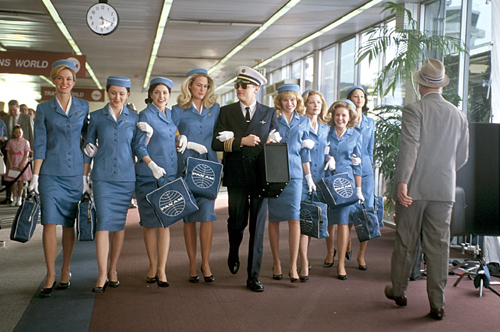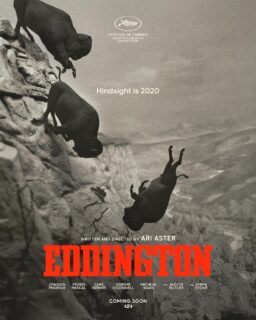NEW YORK–While many directors spend years in gestation before making a film, Steven Spielberg seems cheerfully productive. In June he released “Minority Report,” an awesomely virtuoso futurist thriller starring Tom Cruise, and now here it is December, and he’s back with “Catch Me If You Can,” a more lighthearted film starring Leonardo DiCaprio as a teenage impostor and Tom Hanks as the FBI man on his trail. The movie is based on the true story of Frank Abagnale Jr., who now advises corporations against the same kinds of cons he once perfected.
We talked last summer, we talk again now. Spielberg seems more relaxed about the new film, which was shot on a much lower budget in a relatively short time, and which must have felt like unwinding after the complexities of “Minority Report.”
I told him I’d just seen “Minority Report” again on the big screen, going down to Times Square to catch it, just to confirm my feeling about how good it was.
Spielberg: I haven’t seen it again since it was released. I rarely look back at the movies I’ve made except when my kids see them for the first time. So I get a chance to see all my own movies again through my kids’ eyes, which is always fun, you know, because they tell me whether they like ’em or not right away. Or they walk out. I’ve had my kids walk out of my pictures.
RE: Which one didn’t they like?
Spielberg: They walked out of “Amistad.” I lost my whole family. All my young kids, you know. I wouldn’t ever show them the middle passage and I didn’t let them see the very beginning and they were bored by the legal stuff. They left.
RE: With “Catch Me If You Can,” the story of a kid who passes for a doctor and an airline pilot–you personally lived this story, didn’t you, because you were putting on a suit and tie and walking onto the studio lot at Universal when you were 16 years old?
Spielberg: Yeah, just about. I think a little bit less than 16. And I did that for a whole summer during my high school vacation.
RE: And every single day you were in violation of the law?
Spielberg: Pretty much so. I was trespassing. There were a number of books they could have thrown at me if they had caught me but they never caught me.
RE: I was asked the other day about these kids who sneaked into a Hollywood studio to try to replace bad screenplays with good ones, as a kind of public service prank. Of course, that’s against the law. And I said, yeah, but you know Spielberg did something like that too. I wonder if you have to bend the laws to get into the industry, one way or another.
Spielberg: I don’t know if you have to bend the laws but I think mine was a unique case. I mean, I just had such a desire to make movies. I had been making movies as a high school student, you know, and so I thought the best way to do was watch how the professionals did it, so when I went on the Universal lot I was chasing my dreams. Whereas all the things that Frank Abagnale does in “Catch Me If You Can”–his chutzpah is based on getting away with something as he’s being chased. So he’s being pursued. And I was the pursuer–of a career. That’s why I did what I did.
RE: So actually you saw Abagnale’s book more as a good idea for a movie than as your life story.
Spielberg: Oh yeah. I thought it was a very original story that only happened once in history and only could have been perpetrated by this guy. Once you meet him you see that he was so charismatic and so trustworthy. I could see why he could pull the wool over everybody’s eyes.
RE: Leonardo DiCaprio is 28 in life, and can look 28 or even older, actually, but he can also look like a high school kid. Is that one of the reasons you cast him? Because he could make that jump in age?
Spielberg: I didn’t know how much we could stretch the age but he when he’d comb the bangs over the forehead and he wore the collegiate kind of sweater and he effected a whole different posture of bending over, being very humble, and his voice rose, he was able to step into that character and be totally convincing.
RE: I guess De Niro worked with him early, in “This Boy's Life” (1993) and told Martin Scorsese, “You gotta look out for this kid; he’s gonna be good.” And then in a sense everybody seems to feel his career was sidetracked by “Titanic” because it was too successful.
Spielberg: That’s true.
RE: And so he’s making his “comeback” now after having of all that success. You’ve had a lot of success too. How does that work?
Spielberg: Well, I’ve had a lot of success but I’ve never been traumatized by the cultural phenomenon that came down upon Leo that basically meant that all the credit and all the blame went right to Leonardo DiCaprio. I don’t mean blame for the movie, which was perceived as being a really good movie, but the blame for creating such a media circus. Leo was just a cast member. He was an actor playing a role for many, many months and then he suddenly couldn’t go anywhere. He was a prisoner. A prisoner of hotel rooms, a prisoner in his own home. He couldn’t go anywhere. Everybody’s out there with cameras–and then his life became mythological. The rumors were much greater and much more exaggerated than the facts of his personal life. I think it did stall his career by about four or five years.
RE: But by the time you came to cast him, you felt that he was back in the ranks of just being a good actor. Obviously, he’s a star but….
Spielberg: Yeah, but, you know, I’ve always thought he was a good actor. When I saw “What's Eating Gilbert Grape” (1993), I thought he was a phenomenon. I always wanted to work with him, and he actually predates me on “Catch Me If You Can.” He came first before I decided to direct the movie so he was already attached to play Frank and my job was to go over meet him for the first time, thank him for giving my little daughter Sacha an autograph when “Titanic” came out. I wound up just going crazy for him.
RE: And Tom Hanks was involved at that time or you brought him in?
Spielberg: No, Tom had read the script as a writing sample and called me and Walter Parkes, the co-producer, and said “Can I be in this movie? Do you think Steven would let me play the FBI agent? I really know who this guy is.” And then Tom called me and he said, “Can I kinda horn in here?” And I said, my God, what do you mean horn in? Then he called Leo and said, “Is it an imposition for me to be this movie which is clearly your film? You’re carrying it. Would it be an imposition upon you if I played the FBI agent?” Leo thought that heaven had just come down to earth for him. So in a sense, Tom invited himself into the project in such a humble, beautiful way.
RE: You and Tom have a really good relationship, don’t you?
Spielberg: Yeah, we do.
RE: As an actor/director, as co-producers and friends.
Spielberg: Friend first.
RE: He’s very convincing as just a guy in a suit and a tie and those horned-rimmed glasses in the hat and the FBI agent. And then at the same time, he can do “Saving Private Ryan.” He has an enormous range.
Spielberg: He’s a chameleon. He has amazing range. This is the first movie I think he’s ever been in where he has made a meal of anonymity, because he’s so anonymous for so long in the picture. He doesn’t steal any scenes; he’s not trying to out-act anybody. He’s just trying to play this pencil pusher whose own FBI agents don’t believe all this effort is worth the trouble he’s going through.
RE: This movie was a much shorter shoot than “Minority Report” and a lot of your recent films.
Spielberg: It needed pacing; it needed speed, energy on the set; energy with the cast. It needed the cast knowing I was gonna walk away after four or five takes. We had to use our mojos and our intuition to get us there.
RE: You’ve worked with Tom Cruise as well as with Leonardo DiCaprio, two people who’ve had to deal with the spotlight of fame. Do you get involved in that or do you just kind of…
Spielberg: I’m like a witness to it. I love watching. I went to Japan to open “Minority Report” about a month ago and we walked into 4,000 screaming fans all screaming at the top of their lungs with Japanese accents, “Tom, Tom, Tom” And Tom throws himself into the crowd. He signs autographs, he gets his picture taken with people. He came an hour-and-a-half early to every premiere we did on “Minority Report” in Europe so we could be with the people, let them take his picture, sign their autographs. He is the most generous actor with his own time I have ever experienced when it comes to his fans.
RE: My opinion of “Minority Report” is exactly the same as it was last summer when I had to use a 7-letter word in order to tell you how much I liked it.
Spielberg: It was a beautiful word, though. I’ll never forget it.
RE: Is it going to be overlooked at Oscar time just because of that attention gap problem that the Academy has?
Spielberg: Well, you know, I’m not the one to say whether something deserves attention or not. We directors are in control of everything we do except in the Oscar award season. I’m philosophical about that.
RE: But the problem is that the Academy doesn’t look over the whole 12 months of movies.
Spielberg: That’s true. They look mainly toward the end of the year but at the same time, you know, “The Silence of the Lambs” came out in February and won the Oscar over a year later. “Gladiator” came out I believe in May, and won the Oscar almost a year later and “Private Ryan,” you know, won a lot of Oscars and it came out in July. As far as “Minority Report” is concerned, I’m so philosophical about whether we get recognized. I’d like people in the film to get recognized but as far as I’m concerned it has very low impact with me right now because the film itself was such a gratifying experience. I had a lot of anxiety about the Oscars until I won with “Schindler's List,” and that was so personally meaningful to me that now, well, I’m kind of sanguine.












